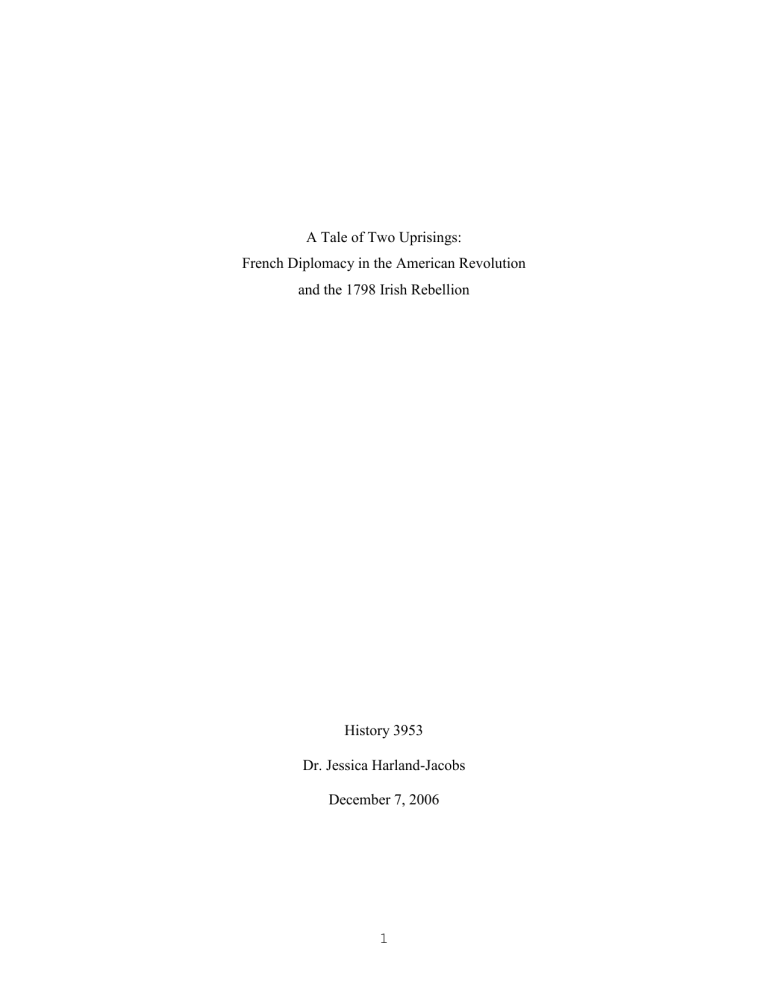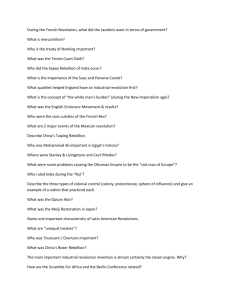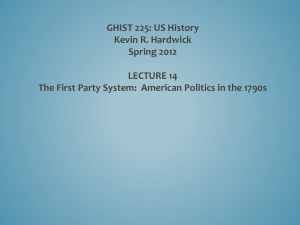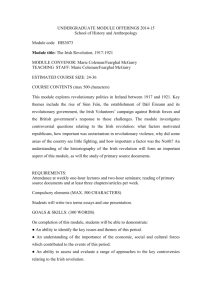Sample 2

A Tale of Two Uprisings:
French Diplomacy in the American Revolution and the 1798 Irish Rebellion
History 3953
Dr. Jessica Harland-Jacobs
December 7, 2006
1
Topic Description and Central Research Questions
The late 1700’s were a period of revolution and change for Europe and its colonies. Following the American example, numerous colonies instigated revolts to shake off their European masters, and the powerful European nation of France underwent a bloody revolution of its own. In this context, I would like to examine French foreign policy towards the American Revolution and the Irish Rebellion of 1798, and how that policy reflected overall French diplomatic thought. In both instances, the French offered aid and support to the rebellious colonies as they revolted against their British masters.
What were the French reasons for supporting these two rebellions, and how did these reasons reflect French foreign policy at the time? Interestingly, in between these two revolts, France experienced a violent revolution in its own government and social structure. How did the 1789 Revolution affect French foreign policy, as seen in French attitudes toward the American Revolution and the Irish Rebellion? Also, both of these revolts supported by France were instances of British colonies’ rebelling against their island overlords. This coincidence gives rise to the question of Britain’s role in French policy; even though French policy changed dramatically, why did Britain remain such an important factor? Finally, the outcomes of the American Revolution and the 1798 Irish
Rebellion were strikingly different: the Americans succeeded in breaking free of the
British yoke while the Irish failed miserably. How much did French support (or lack of it) affect the outcomes of these revolts?
Historiographical Debate
Although historians have written extensively on the American Revolution and
Irish Rebellion, all examinations of the two events have been conducted separately, with
2
no correlation between them. A comparison of French policy towards the revolts has never been examined in detail; therefore, I will need to draw on existing historiography to speculate on this new topic.
Many historians have studied the American Revolution and have acknowledged the French role in the success of the resistance. The widespread characterization of the
French-American relationship is one of mutual enthusiasm and clear-cut decision making. However, a few historians have examined the French involvement more closely and have determined that the above characterization is oversimplified and surface-deep.
In the historical world, the French motives for participation in the American Revolution have not been so much debated as overlooked. It is widely agreed that France saw the
American Revolution as an opportunity to weaken Britain and to regain lost sugar islands in the Caribbean. Because of the eventual diplomatic benefits of supporting the revolution, there may not have been any pressing need to examine closely the French decision regarding the colonies. Although France had played a role in instigating the
American Revolution, there were apparently some lingering doubts in the French government about directly supporting the revolt. As early as the 1960’s, historians began to realize that, in the words of Ralph Ketcham, “many of the pat generalizations about foreign influence during the formative years of American nationhood [became] increasingly unsatisfactory.”
1
In his article, Ketcham states that both Louis XVI and
Turgot, the finance minister, had doubts about the American venture. Indeed, according to a first-hand report in 1778, the French only publicly supported the revolution after an
American victory at Saratoga. I am unsure of where I will position myself in this debate,
1 Ralph L. Ketcham, “France and American Politics, 1763 – 1793”. Political Science Quarterly 78 (1963):
198.
3
as I need to research French records and sources to determine whether they hesitated in supporting the American cause.
Historians’ views of the French role in the 1798 Irish Rebellion have differed in the last 20 years. One view of French involvement is evident in Marianne Elliott’s work
Partners in Revolution: The United Irishmen and the French . She portrays the French as enthusiastic participants in the Irish rebellion, and cites revenge against Britain as one of their main reasons for involvement. Although general incompetence and miscommunication between the French and the Irish hampered French involvement,
Elliott claims that France was eager to avenge itself against Britain for Britain’s support of the Vendée uprisings during the early revolutionary years. Gordon Bond supports this view in his review of Elliott’s book, as he states that a “French landing of any consequence, it was assumed, would trigger an armed insurrection [and] gain for France a republican ally against Britain.”
2
This statement hints that France was the proactive force in this rebellion and a key instigator of the revolt.
However, an opposing view has emerged in the late 1990’s, as evidenced by
Hugh Gough’s chapter on the French in Ireland. According to Gough, the French were reluctant to involve themselves in an Irish revolt and only gave aid after the United
Irishmen assured them of victory. After the French Revolution, France’s foreign policy focused on combating the various coalitions of other European nations that formed in opposition to the new French government. At the center of many of these coalitions was
Britain, a nation that habitually opposed France in various European and colonial wars; naturally, France wanted to weaken Britain and extend its influence throughout Europe.
2
Gordon Bond. Review of Partners in Revolution: The United Irishmen and France , by Marianne Elliott.
The American Historical Review 89, no. 1. (1984): 129.
4
However, Gough argues that the French government did not want to use Ireland to weaken Britain because it felt that getting involved in Ireland was too risky and had the potential of becoming a very messy and expensive war. French politicians and generals decided to focus on Italy and Egypt instead of Ireland, and accordingly sent the bulk of
French troops to these two campaigns. Gough also proposes that France did not want to help instigate an Irish rebellion, but only wanted to involve itself after the Irish revolted of their own initiative. Therefore, both in 1796 and 1798, the French were “poorly placed to respond” to Irish calls for aid and were unable to respond in a timely, efficient manner.
3
In this debate, I plan to support the more recent historiographical analysis of
France’s attitude towards the 1798 Irish Rebellion. I believe that France did want to weaken Britain, and thought that Ireland might have been a good opportunity to achieve this goal. However, I also believe that the French government had distanced itself from the emotional foreign policy of the Terror, and did not want to involve itself in a risky venture simply for revenge’s sake. It seems that the Directory had clearly invested itself in its southern campaigns and was having enormous success in Italy. Getting into a long, drawn out conflict with the powerful British presence in Ireland was a more dangerous move than focusing on spreading French influence in Italy and the Rhineland. I also believe that if France had wanted to enthusiastically embrace the Irish rebellion, they would have invested more troops and effort into the undertaking, and not have offered half-hearted support to the Irish cause.
3
Hugh Gough. “France and the 1798 Rebellion”. In The Great Irish Rebellion in 1798 , edited by Cathal
Pốirtếir. Colorado: Mercier Press, 1998.
5
Preliminary Arguments
The French Revolution of 1789 had an enormous impact on French foreign policy, as French attitudes toward foreign relations changed dramatically from the Ancien
Regime to the revolutionary governments. For the purposes of this paper, I would like to focus on how French support in the American Revolution and the Irish rebellion reflected the overall French foreign policy at the respective times of the rebellions. The policy of the Ancien Regime focused on maintaining the balance of power in Europe in France’s favor, and the French government welcomed the American Revolution as a chance to diminish Britain’s economic and naval power. The French actively fostered Anglo-
American hostilities in the aftermath of the French and Indian War and enthusiastically offered economic and (eventually) political support. However, the revolutionary governments of France were not concerned with the European balance of power; instead, they focused on defending French interests against practically all of Europe. Unlike the
American Revolution, the French refused to help instigate the Irish rebellion, and were reluctant to directly involve themselves in a potentially messy and risky campaign. This contrast of an enthusiastic response versus an unenthusiastic response demonstrates a significant change in French foreign policy, and the different French responses to these two revolts serve to encapsulate the policies of the Ancien Regime and post-revolutionary governments. I will especially focus on the French reasons for involvement in the two rebellions and the reasoning process the French government undertook to reach their decisions. In connection with differing responses, I would also like to speculate as to how significant the different policies were in determining the outcomes of the revolts; while an overwhelming French response to the American Revolution provided the much needed
6
aid for an American victory, a lukewarm French response the Irish cause doomed the rebellion before it even began.
Methodology
Although the French involvement in the American Revolution and the 1798 Irish
Rebellion can be approached from many aspects, I plan to limit my field by focusing on sources that reveal the French foreign policy at the times of the two revolutions, specifically the French diplomatic reasons for getting involved. I will then attempt to demonstrate how French involvement in the revolutions embodied the government’s policy at the time of the revolutions. Once I identify the foreign policies at the times of the rebellions, I will briefly compare the policy prior to the French revolution to the policy following the revolution. Finally, I will examine the effect the French aid had on the rebellions, and whether the French policy directly affected the amount of aid offered and, consequentially, the results of the revolutions. In examining French foreign policy, primary sources I will use include French, American, and Irish diplomatic reports and correspondences. I have already examined an American diplomatic report of the
European reaction to the American Revolution, and it has proved valuable in gauging
France’s response to American victories. I also plan to examine sources that communicate French foreign policy to the public, such as speeches, pamphlets, and newspapers. Count Boissy d’Anglas’s speech to the Directory government gives an interesting picture of French policy shortly after the French Revolution shattered the country. Finally, I will use memoirs to determine individual reactions and beliefs regarding French foreign aid; I have already included the memoirs of Theobald Wolfe
Tone, an important United Irishman ambassador to France.
7
Annotated Bibliography
Primary Sources
Boissy d’Anglas, François Antoine, comte de. The speech of Boissy d’Anglas, on the policy of the French Republic with respect to foreign nations; adopted by the
Convention, as a declaration of the principles of the French people. Jan. 30,
1795 . And the proclamation of the assembly of the provisional representatives of the Commune of Amsterdam.
London: printed for D. I. Eaton, 1795.
In a speech to the National Convention in 1795, French statesman Count Boissy d’Anglas summarized what he felt were essential principles of the Convention’s foreign policy. The Count was a fervent French patriot and strongly believed in the ideas of liberty and equality; these views are evident in a rather biased statement that foreign nations attacked and defamed France due to France’s new, liberal-minded government.
He was particularly vehement against the British, and claimed that Britain was using the other European nations to weaken France. Finally, the Count also stated that France did not intend to stir up internal discord in other nations, a view consistent with France’s reluctance to instigate rebellion in Ireland in the late 1790’s. Although this speech was probably influenced by passionate patriotism and may not make logical deductions, it is a good primary view of early French foreign policy following the Reign of Terror.
Boston, April 20: The following articles of intelligence … received by Prigate [sic]
L’Sensible … arrived at Falmouth, Casco-Bay … and came to hand last evening
…
. Boston: s.n., 1778.
This document is a dispatch addressed to the American Continental Congress, and is a description of the state of affairs in Europe in 1778. Although the author of this document is unknown, it is clear that he was a correspondent of the Continental Congress regarding the state of affairs in Europe. He seems to have resided in France, and wrote dispatches to the Congress detailing European responses to the American Revolution.
This source is extremely useful in determining French (and European) foreign policy at this time in history. For example, early in the revolution, the French government had been wary of publicly allying themselves with the Americans; however, this author provides a firsthand account of a change in this policy, as he reports that the American
8
victory at Saratoga propelled the French court to create a preliminary, official treaty of alliance. He also reports on widespread European feeling regarding the revolution, and indicates the revolution’s importance in the standard European foreign policy of the day.
Brissot de Warville, Jacques-Pierre.
Nouveau voyage dans les Ếtats-Unis de l’Amếrique septentrionale, fait en 1788 . Paris: Buisson, 1791.
Neilson, Samuel. Brief statement of negotiation between certain united Irishmen and the
Irish government, in July, 1798 . New York: [s.n.] 1802.
Tone, Theobald Wolfe. Life and adventures of Theobald Wolfe Tone/ written by himself and extracted from his journals; ed. By his son, William Theobald Wolfe Tone .
London: Burns Oates & Washbourne ltd., [18--].
Secondary Sources
Bond, Gordon. Review of Partners in Revolution: The United Irishmen and France , by
Marianne Elliott. The American Historical Review 89, no. 1. (1984): 129.
Gordon Bond, a preeminent historian at Auburn, wrote this review to a book that is included later in this bibliography. Bond gives the book an overall good review, remarking that the author’s accounts of intricate Irish politics are stronger than her military accounts. However, in this review Bond makes a statement that corresponds with a sentiment in the book that is important in the historiography on this topic. He states that it was assumed that a “French landing [would] trigger an armed insurrection”, and France would accomplish her goal of further isolating Britain. This view is an effective statement of earlier views on this subject, as some historians’ views of French involvement changed from one advocating French enthusiasm to one proposing French reluctance. I intend to agree with the view of French reluctance, and feel it is important to include historiographical debate on the issue in this paper.
Elliott, Marianne. Partners in Revolution. The United Irishmen and France . New
Haven/London: Yale University Press, 1982.
Marianne Elliott’s extremely detailed book on the relationship between France and the United Irishmen contains much more information than is necessary for this paper.
9
For this reason, I have focused on the sections regarding the French negotiations with the
United Irishmen prior to the rebellion itself. In these sections, Elliott chronicles the everchanging French policy towards Ireland from Robespierre to the Directory, and speculates as to why the changes took place. She also provides an excellent picture of a fluid, ever-changing relationship between the Irishmen and the French, and highlights the miscommunication and incompetence of both parties. Her analysis is strong, as she draws on multiple primary sources and official documents. She offers an earlier historiographical viewpoint on this topic, as she claims that revenge against Britain was a large factor in France’s attitude towards Ireland. Although I do not agree entirely with her reasoning, she does have a valid viewpoint that must be addressed in this paper.
Gough, Hugh. “France and the 1798 Rebellion”. In
The Great Irish Rebellion in 1798 , edited by Cathal Pốirtếir. Colorado: Mercier Press, 1998.
In this edited volume I am particularly interested in Hugh Gough’s view on the role of the French in the 1798 Irish Rebellion. His chapter is very informative, and offers unique speculations on the French reasons for helping the Irish. Gough first gives a brief summary of French foreign policy after the 1789 Revolution, touching on the disunity in the Directory government. He then attempts to clarify the French position towards
Ireland, and theorizes on the proposed French reluctance to proceed in giving aid. Finally, he speculates on the failure of the rebellion, offering three very plausible factors that contributed to the Irish defeat. In my opinion, this is a strong lecture with rational reasoning. Gough’s conclusions seem very logical, and he offers a decent range of sources and support for his views. The piece’s only weakness is that Gough’s thought is speculation; although he offers support for his ideas, they are not concrete fact. This is an extraordinarily useful viewpoint regarding French diplomatic thought, and challenges earlier beliefs regarding French willingness to proceed in this rebellion.
Idzerda, Stanley J. France and the American War for Independence . Scott Limited
Editions Inc: 1976. (No place of publication)
Kaiser, Thomas E. “From the Austrian Committee to the
Foreign Plot: Marie-Antoinette,
Austrophobia, and the Terror”.
French Historical Studies 26, no. 4 (2003): 579.
10
As evidenced by its title, this article primarily examines the Austro-French relations before, during, and after the Terror. Although Austro-French relations are not included in this paper, the article offers a unique examination of French foreign policy as it underwent enormous changes in the Revolution. Using the relations between France and Austria as a focal point, Thomas Kaiser follows French diplomacy from the Ancien
Regime through the Terror and the Directory, ending with the Napoleonic reign. For me, the value in this article lies not in Kaiser’s detailed analysis of France’s diplomatic policy towards Austria; rather, the value lies in his account of the transformation of French foreign policy from “the reign of international politics based on cross-dynastic marriages” to a more patriotic, individualistic policy that focused on the interests of the
French people. As I am not an expert on Austro-French relations, I cannot judge if this article is a strong or weak assessment of that topic. However, I believe Kaiser’s speculations on the changing French policy are very well thought out and useful. It offers a new perspective on what the author himself refers to as a neglected field.
Ketcham, Ralph L. “France and American Politics, 1763 – 1793”. Political Science
Quarterly 78, no. 2 (1963): 198.
This fascinating article offers a very different perspective on the glorified French alliance with America in the American Revolution. Through the lens of early American politics, Ralph Ketcham portrays an alliance that was characterized by mistrust and controversy from both parties. Although most of the article focuses on debate between early American political figures, it gives a detailed account of the actions of French foreign ministers to further French interests in America. The author states that many in the French government were hesitant to ally with America, including the finance minister and the king himself. He also claims that France mainly viewed America as a tool to weaken Britain, and that France wanted America to be free from Britain but not gain international power. This article proposed ideas that I had never heard of before; I had always thought that the French had viewed the American alliance with enthusiasm, not hesitancy. The main weakness in Ketcham’s analysis is that he does not examine French diplomatic thought closely enough. He gives numerous accounts of France manipulating
American politics to further its own interests, but he does not spend enough time
11
examining these particular interests in detail. However, other than this small problem the article is very informative, and provides a strong analysis in an oversimplified field.
Scott, Samuel F. French aid to the American Revolution: an exhibition in commemoration of a victorious alliance . Ann Arbor: William L. Clements
Library, 1976.
This little book gives a concise summary of France’s participation in the
American Revolution, beginning with shortly after the French and Indian War. This is not an historical analysis; it merely chronicles a course of events. It is useful in analyzing the pre-revolutionary years, as France actively fostered Anglo-American dislike in the 13 colonies. The book includes a section on the French and Indian War, and the important role it played in determining French-Anglo-American relations in this time period.
However, this may not be a very strong source, as it contains no analysis or historiographical implications.
12







